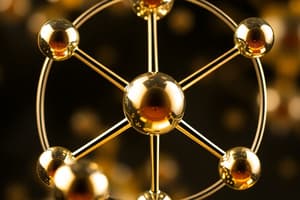Podcast
Questions and Answers
Which of the following statements about protons is true?
Which of the following statements about protons is true?
- Protons have a neutral charge
- Protons have a negative charge
- Protons have a positive charge (correct)
- Protons have no influence on electrons
What is the relationship between the number of protons and the positive charge of an atom?
What is the relationship between the number of protons and the positive charge of an atom?
- Atoms with higher numbers of protons have no influence on the positive charge
- Atoms with higher numbers of protons have a more substantial positive charge (correct)
- Atoms with higher numbers of protons have a negative charge
- Atoms with higher numbers of protons have a weaker positive charge
What is the relationship between the number of protons and the radius of an atom or ion?
What is the relationship between the number of protons and the radius of an atom or ion?
- Atoms with higher numbers of protons have a neutral charge
- The number of protons has no influence on the radius
- Atoms with higher numbers of protons have a larger radius
- Atoms with higher numbers of protons have a smaller radius (correct)
Which of the following ions are in an isoelectronic series?
Which of the following ions are in an isoelectronic series?
What is the relationship between the number of protons and the ionic radius of an anion?
What is the relationship between the number of protons and the ionic radius of an anion?
Which statement best describes the ionic radius of an atom?
Which statement best describes the ionic radius of an atom?
What is the relationship between the number of electrons gained or lost and the ionic radius of an atom?
What is the relationship between the number of electrons gained or lost and the ionic radius of an atom?
What happens to the ionic radius of an atom when it gains an electron?
What happens to the ionic radius of an atom when it gains an electron?
What happens to the ionic radius of an atom when it loses an electron?
What happens to the ionic radius of an atom when it loses an electron?
Can ions of different elements have the same ionic radius?
Can ions of different elements have the same ionic radius?
Flashcards are hidden until you start studying




